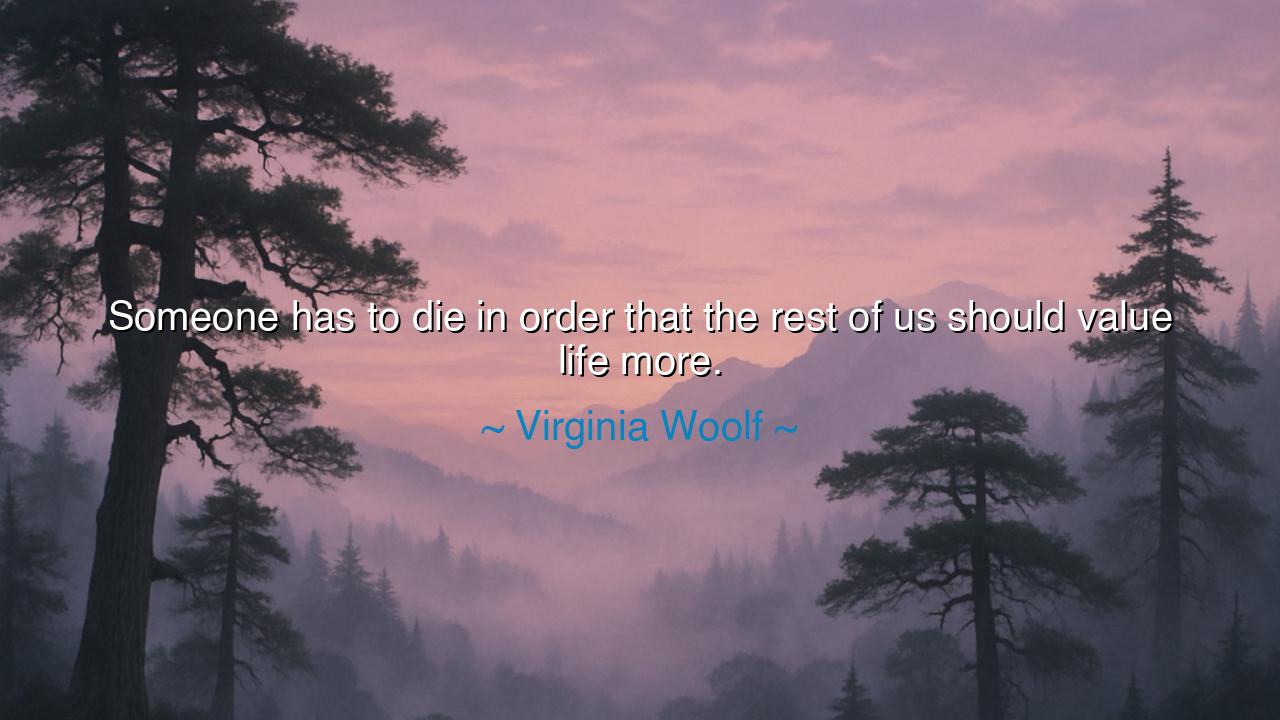
Someone has to die in order that the rest of us should value life






Hear these words, children of time and sorrow, spoken by Virginia Woolf, a weaver of thought and emotion, who walked among both light and shadow: “Someone has to die in order that the rest of us should value life more.” In this simple yet piercing sentence, Woolf unveils one of the oldest and most tragic truths of human existence — that we often awaken to the beauty of life only in the presence of death. It is a truth both cruel and sacred, for through loss we are reminded of what we take for granted; through endings, we learn the holiness of beginnings.
Woolf herself lived with a soul tuned to the fragile frequencies of existence. Her words do not glorify death, nor do they call for it — rather, they acknowledge its strange necessity in the awakening of the human heart. For in our daily living, surrounded by the familiar, we grow numb to the miracle of breath, of sunlight, of touch. We forget that to live is to stand at the edge of mystery every moment. It is only when death enters — when someone vanishes from the pattern of our days — that we begin to see what was always sacred. The loss of one life becomes the illumination of many.
Think of the story of Socrates, who faced his death not with fear but with serenity. As his disciples wept, he told them that death was merely a passage, and that his departure would teach them more than his presence ever could. And indeed, after his passing, their understanding deepened; their reverence for life and wisdom grew. So it is that Woolf’s words echo across the centuries: the sacrifice, the departure, the silence of one soul can awaken an entire people to the weight and wonder of being alive. Death, in this light, is not merely an ending — it is a teacher.
Yet Woolf’s truth is a bitter one. Why must we learn the value of life through pain? Why must death be the mirror that reveals life’s beauty? Perhaps because we are creatures of habit, blinded by the very constancy of our blessings. The ancients spoke of this in parable and myth: of Persephone, whose descent into the underworld brought winter to the earth, and whose return each spring made all things bloom again. Through her death and rebirth, the world was taught to cherish the cycles of loss and renewal. So too are we shaped — not by endless summer, but by the frost that teaches us what warmth truly means.
In Woolf’s voice there is also compassion — a recognition of the cost. She does not say that death should happen, but that when it does, we must not let it be in vain. Someone has to die — not by fate’s cruelty alone, but as part of the great rhythm of existence. And in that moment, the living are given a sacred duty: to value life more. To carry forward what was lost, to live with greater depth, with greater love, with greater awareness. Thus, the dead are not gone; they become the unseen teachers of the living.
Consider the quiet legacy of those who perished in great trials — the soldiers who fell in war, the martyrs who stood for justice, the loved ones whose absence reshaped our hearts. Their deaths became the soil from which new compassion grew. After the horrors of the First World War, a generation scarred by grief sought peace with fervor. After the loss of leaders like Martin Luther King Jr., millions rose to carry forward the torch of equality. In each case, the end of one life reignited the meaning of all others. Thus, through mourning, humanity rediscovers its moral and spiritual sight.
Take, then, this lesson as one carved into the bones of time: do not wait for death to teach you how to live. Let every breath remind you that life is fleeting, that love is fragile, that every sunrise is a miracle unearned. Do not measure time by the number of your days, but by the fullness with which you live them. Hold those around you as if each embrace were the last; speak kindness while the ears that need it still hear. For the greatest way to honor those who have died is not through sorrow, but through presence — through living more fiercely, more gently, more awake.
And when death comes — as it must, as it always will — do not see it as the cruel thief of meaning, but as the silent guardian of it. For as Woolf knew, death and life are not enemies, but reflections. One defines the other; one deepens the other. The passing of one soul is a bell that calls the rest of us to attention — to cherish this fragile, shining gift we call existence, before the door closes and the light moves on.






AAdministratorAdministrator
Welcome, honored guests. Please leave a comment, we will respond soon